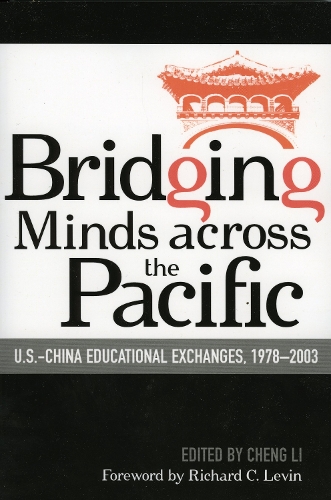
Bridging Minds Across the Pacific: U.S.-China Educational Exchanges, 1978-2003
(Paperback)
Publishing Details
Bridging Minds Across the Pacific: U.S.-China Educational Exchanges, 1978-2003
By (Author) Cheng Li
Contributions by Mary Brown Bullock
Contributions by Ruth Hayhoe
Contributions by Cheng Li
Contributions by Kathryn Mohrman
Contributions by Gerard Postiglione
Contributions by Stanley Rosen
Contributions by Caroline Haiyan Tong
Contributions by Fei-Ling Wang
Contributions by Hongying Wang
Bloomsbury Publishing PLC
Lexington Books
24th February 2005
United States
Classifications
Professional and Scholarly
Non Fiction
Politics and government
370.1162
Physical Properties
Paperback
284
Width 154mm, Height 228mm, Spine 22mm
426g
Description
Bridging Minds Across the Pacific offers new insight into U.S.-China relations by looking at the far-reaching dynamics of educational exchanges between these two countries. Deng Xiaoping's milestone decision in 1978 to send a large number of Chinese nationals to study in the United States has fostered increased cross-Pacific dialogue among academics. In recent years a tidal wave of "returnees" who studied abroad have moved back to China. Cheng Li and this volume's distinguished contributors examine how these individuals are working to shape their home country, especially in social science curriculum development, program-building, and research, and in public policy formation. This book explores whether sweeping educational exchanges between these two profoundly different countries have promoted productive mutual understanding.
Reviews
Dr. Cheng Li, a leading scholar on China and the United States, has edited this penetrating and comprehensive book on U.S.-China educational exchanges with its enormous impact on China as well as its limits and problems. It is a must-read for anyone interested in this most important relationship. -- James R. Lilley, American Enterprise Institute, formerly U.S. Ambassador to China and Korea
In 1979, President Jimmy Carter expressed the hope that educational exchanges between the United States and China, which were just beginning, would become 'a routine part of the everyday life of both the American and Chinese people.' Carters wish, shared by Chinas Deng Xiaoping, has been realized. This outstanding collection of essays is the story of twenty-five years of educational exchanges that have contributed to the development of U.S.-China relations, but more importantly have been a major factor in the profound normative changes in China since Dengs 'Reform and Opening' began. -- John L. Holden, president, National Committee on U.S.-China Relations
We owe a debt of gratitude to Cheng Li and his colleagues for focusing attention on an often neglected but increasingly important dimension of U.S.-China relations, and for doing so in a comprehensive, interdisciplinary, and historically rooted manner that recognizes both the problems and the promise of transnational educational exchange. -- Peter F. Geithner, Harvard University Asia Center, formerly founding director of the Ford Foundation in China
Brilliant students from China have taken doctorates in the United States, while relatively few Americans have studied language in China. How has educational exchange affected both countries What recent cracks have appeared in the educational bridge This book is the first to provide detailed statistical and narrative accounts to answer such questionsand to link the answers to constructivist theory in international relations. Anyone interested in China or Sino-American relations should read this wonderful book. -- Lynn T. White, Princeton University
In the twenty-five years since China opened up, 700,000 Chinese have traveled abroad to study; 172,000 have already returned. This book is the best account yet of this intellectual interchange that has brought not a clash but a dialogue between civilizations. The result: a renaissance of intellectual life that has led China to stop promoting revolutions and instead promote trade, investment, and international conferences. -- Ezra F. Vogel, Harvard University
Author Bio
Cheng Li is William R. Kenan Professor of Government and Chair of Asian Studies at Hamilton College.
